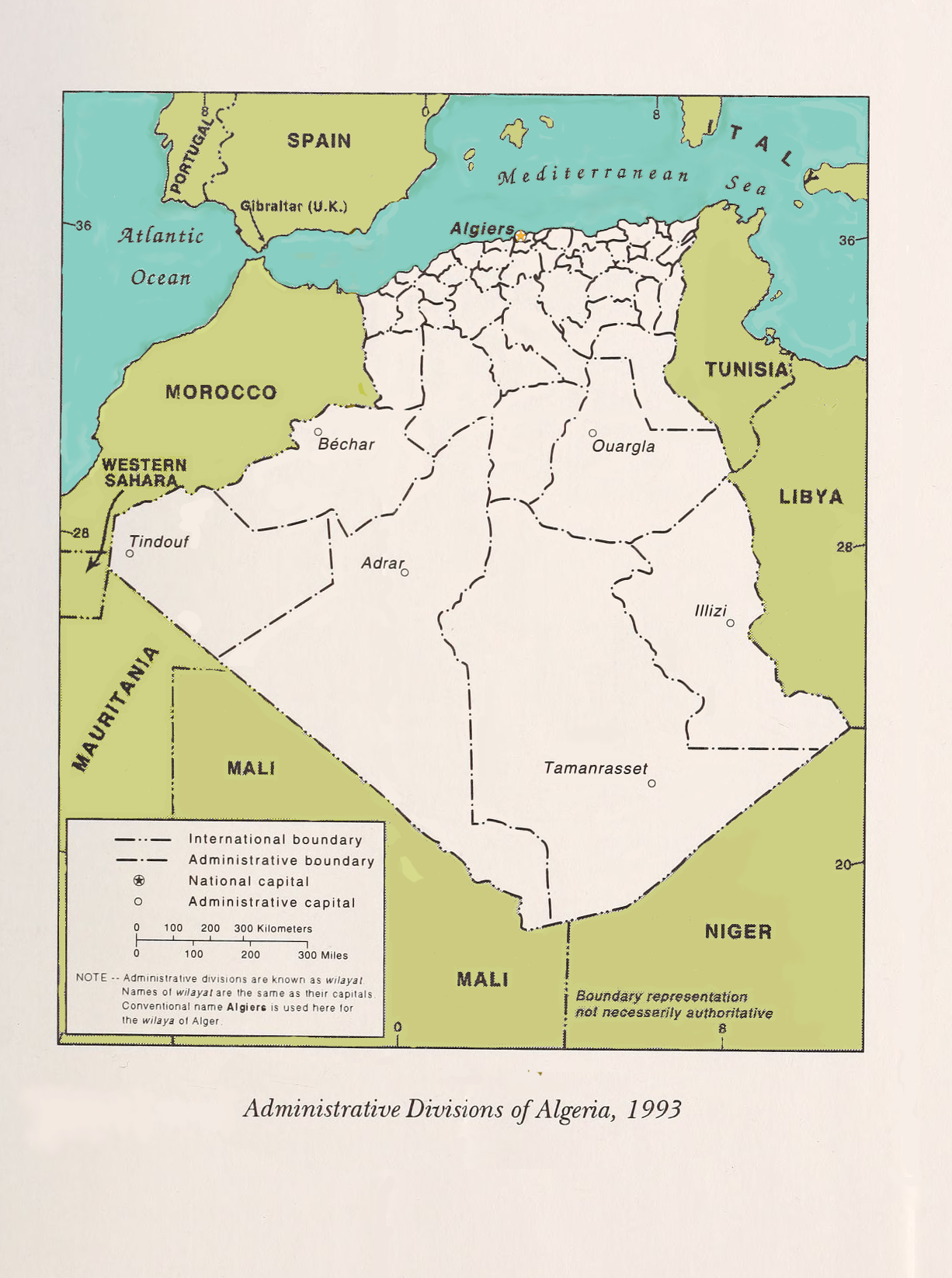People's Democratic Republic of Algeria: Difference between revisions
No edit summary |
(Added infobox.) Tag: Visual edit |
||
| Line 1: | Line 1: | ||
'''Algeria''' ( | {{Infobox country|name=People's Democratic Republic of Algeria|native_name=الجزائر<br>ⵍⴻⵣⴰⵢⴻⵔ<br> Algérie|image_flag=Flag of Algeria.png|capital=Algiers|mode_of_production=[[Capitalism]]|government_type=Unitary Bourgeois People's Republic|national_motto="By the people and for the people"|image_map=Algeria map.png|image_map_size=250|common_languages=Arabic<br>Berber<br>French|religion=99% Sunni Islam<br>1% Other|demonym=Algerian}} | ||
'''Algeria''' (Standard Arabic: الجزائر, al-Jazā’ir; Berber: ⵍⴻⵣⴰⵢⴻⵔ, Dzayer), officially the '''People's Democratic Republic of Algeria''', is a country located in North Africa. It is the largest | |||
country on the Mediterranean sea, the second largest on the African continent and the eleventh-largest country in the world in terms of land area. It is bordered by [[Tunisia]] in the northeast, [[Libya]] in the east, [[Niger]] in the southeast, [[Mali]] and [[Mauritania]] in the southwest, a few kilometers of the Moroccan-controlled Western Sahara in the southwest, [[Morocco]] in the west and northwest, and the Mediterranean Sea in the north. Its size is almost 2,400,000 km2 with an estimated population near to 35,000,000. The capital of Algeria is Algiers. | |||
Algeria is a member of the [[United Nations]], African Union, OPEC and the Arab League. It also contributed towards the creation of the Maghreb Union. | Algeria is a member of the [[United Nations]], African Union, OPEC and the Arab League. It also contributed towards the creation of the Maghreb Union. | ||
| Line 11: | Line 14: | ||
[[Category:Algeria| ]] | [[Category:Algeria| ]] | ||
[[Category:African countries]] | [[Category:African countries]] | ||
[[Category:Countries]] | |||
[[Category:Global south]] | |||
Revision as of 00:06, 22 July 2022
| People's Democratic Republic of Algeria الجزائر ⵍⴻⵣⴰⵢⴻⵔ Algérie | |
|---|---|
|
Flag | |
Motto: "By the people and for the people" | |
 | |
| Capital | Algiers |
| Common languages | Arabic Berber French |
| Religion | 99% Sunni Islam 1% Other |
| Demonym(s) | Algerian |
| Dominant mode of production | Capitalism |
| Government | Unitary Bourgeois People's Republic |
Algeria (Standard Arabic: الجزائر, al-Jazā’ir; Berber: ⵍⴻⵣⴰⵢⴻⵔ, Dzayer), officially the People's Democratic Republic of Algeria, is a country located in North Africa. It is the largest
country on the Mediterranean sea, the second largest on the African continent and the eleventh-largest country in the world in terms of land area. It is bordered by Tunisia in the northeast, Libya in the east, Niger in the southeast, Mali and Mauritania in the southwest, a few kilometers of the Moroccan-controlled Western Sahara in the southwest, Morocco in the west and northwest, and the Mediterranean Sea in the north. Its size is almost 2,400,000 km2 with an estimated population near to 35,000,000. The capital of Algeria is Algiers.
Algeria is a member of the United Nations, African Union, OPEC and the Arab League. It also contributed towards the creation of the Maghreb Union.
History
France seized Algeirs from the Ottoman Empire in 1830 and over the next four decades established their control over the rest of Algeria, making it a French colony. In the 1950s and 60s the indigenous people of Algeria, under the leadership of the Front de libération nationale (FLN), struggled to free the country from French rule. Algeria achieved independence in 1962. Its first president was FLN leader Ahmed Ben Bella. In the 1960s and 70s, under Ben Bella and his successor Houari Boumédiène, Algeria pursued industrialisation within a state-controlled socialist economy. Agriculture and the oil wells were nationalised.
Algeria was the home of Franz Fannon, the famous anti-colonial writer
